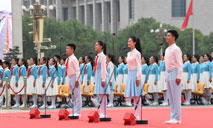China pledges to further enhance science literacy of citizens
BEIJING, June 25 (Xinhua) -- China has seen significant improvement in the science literacy of its citizens and has pledged to further enhance progress in this regard, according to a new plan for promoting science literacy of the people by the State Council.
By 2025, the proportion of scientifically literate Chinese citizens will exceed 15 percent, with marked progress in the even distribution of scientific literacy in all regions and groups of people nationwide, said the action plan for science literacy of the people (2021-2035).
The figure is expected to reach 25 percent by 2035, with significantly narrowed urban-rural gaps and gaps among regions nationwide, said the plan.
Science literacy refers to the spirit of scientific aspiration, knowledge of basic science and scientific methods, as well as applying them in analyzing and solving problems.
China has continued to improve science education and training, develop facilities for science popularization, and increase investment in this regard, with the proportion of scientifically literate Chinese citizens increasing to 10.56 percent in 2020.
In the next five years, the plan says China will invest major effort in five key projects in the following fields: popularization of sci-tech resources; the promotion of popular science; popular-science infrastructure; the promotion of popular-science ability at the grass-roots level; and international exchanges and cooperation.
The new plan lists five priority groups: teenagers; farmers; industrial workers; the elderly; and leading cadres and civil servants.
The primary task of improving the science literacy of teenagers lies in upgrading the science literacy of their teachers.
China pledges to improve science literacy among teachers at the primary education stage by facilitating their access to new knowledge and teaching skills and cultivating science teachers in rural areas, says the plan.
Efforts will also be made to improve science literacy of the elderly by offering seniors more training on smart-device applications and easier social-health services, among others, says the plan.
In 2020, there were 264 million people in China aged 60 or above, accounting for 18.7 percent of the total population. It is estimated that by 2035, the number will exceed 400 million, accounting for a quarter of the total.
Photos
Related Stories
- Senior official urges Chinese scientists to advance sci-tech
- China launches cargo spacecraft to dock with space station module
- China's cargo craft successfully docks with space station module
- Fusion of science, art to illustrate sci-tech innovations
- Interview: Opening of China's FAST telescope to int'l scientists enhances collaboration, says Australian astrophysicist
Copyright © 2021 People's Daily Online. All Rights Reserved.










